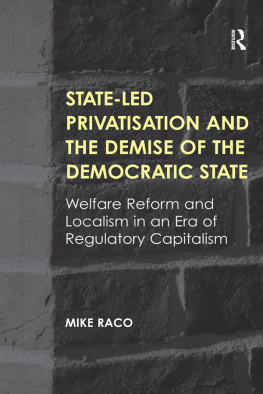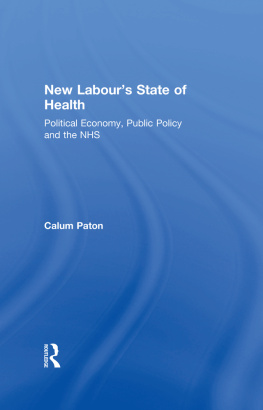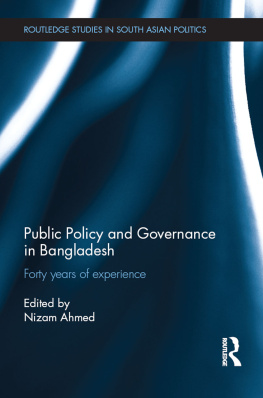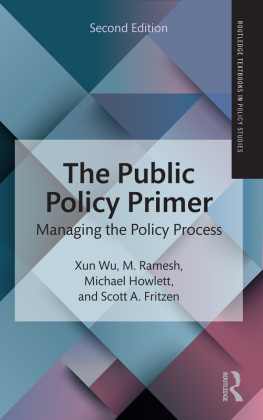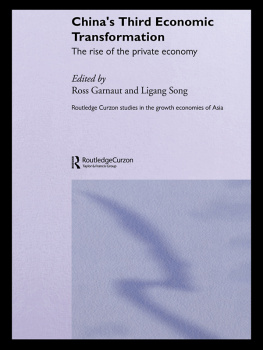London
Megacities
Series Editor: H. V. Savitch
As drivers of economic growth, demographic change and consumption, hyper-conurbations offer unique opportunities to their hinterlands and national economies, as well as huge challenges of governance, planning and provisioning. Each book in this series examines the political and economic development of a specific megacity and explores how and why they have evolved and how policy decisions, couched in geopolitics, have shaped their outcomes. The series covers both paradigmatic mature megacities of the developed world, as well as the fast-growing emerging megacities of South and East Asia, and Latin America.
Published
London
Mike Raco and Frances Brill
Paris
Christian Lefvre
London
Mike Raco and Frances Brill

Mike Raco and Frances Brill 2022
This book is copyright under the Berne Convention.
No reproduction without permission.
All rights reserved.
First published in 2022 by Agenda Publishing
Agenda Publishing Limited
The Core
Bath Lane
Newcastle Helix
Newcastle upon Tyne
NE4 5TF
www.agendapub.com
ISBN 978-1-78821-305-9 (hardcover)
ISBN 978-1-78821-306-6 (paperback)
British Library Cataloguing-in-Publication Data
A catalogue record for this book is available from the British Library
Typeset by Newgen Publishing UK
Printed and bound in the UK by CPI Group (UK) Ltd, Croydon, CR0 4YY
Contents
The book draws on over a decade of research during which we have examined different aspects of Londons planning and development. Much of it was written and researched during the Covid-19 pandemic and we wish to express our deep gratitude to all of those who made the work possible during a time of unprecedented difficulty. In particular we would like to thank two Sarahs Sarah Read and Sarah Hughes-McLure (and Oslo) for their perfect balancing of inspiration and distraction during the lockdown.
Many of our ideas were developed collaboratively and would not have emerged without the intellectual engagement of, and ongoing encouragement from, a range of people too many to mention. But we would like to express particular thanks for the great conversations with Tuna Tasan-Kok and Sara zogul at the University of Amsterdam and Patrick Le Gals and colleagues at Sciences-Po Paris. Thanks especially to the WHIG research team at UCL for all their constant encouragement, intellectual engagement and support Claire Colomb, Dan Durrant, Jess Ferm, Sonia Freire-Trigo, Iqbal Hamiduddin, Nicola Livingstone, Paul Moawad, Danielle Sanderson, John Tomaney, Callum Ward and Annie Webb. The book could not have happened without you.
For the arguments around new investors, we would like to thank all those who supported Francess PhD research in the Department of Geography at UCL, especially Jenny Robinson and Ludovic Halbert, and Phoebe Stirling whose stint in Cambridge has proven particularly inspirational.
Arguments developed in the book were discussed at a variety of events, conferences and seminars and we would like to thank all those who asked questions and raised comments. Allan Cochrane, the late John Henneberry, Maria Kaika, and Jennifer Peters also acted as hugely valuable respondents and contributors to WHIG sessions. Special thanks also to the various reading and writing groups at University of Cambridges Geography Department and the Bartlett School of Planning, UCL. In particular we would like to thank Joe Penny for his wise words and reminding us it is not how to publish but why publish that matters.
Many thanks also to Hank Savitch, the series editor and Alison Howson of Agenda Publishing, for their input and support over the last couple of years and their patience in the wake of the pandemic. We also gratefully acknowledge the comments of referees on the original draft their insights and thoughts were incredibly valuable.
Formally, we also wish to acknowledge the support of the Economic and Social Research Council UK [Grant Number: ES/S015078] under the project WHIG What is Governed in Cities: Residential investment landscapes and the governance and regulation of housing production.
Mike Raco, Petts Wood, Kent
Frances Brill, Trumpington, Cambridge
This book addresses what, on the face of it, seems a straightforward question: who is governing London and how? Similar questions are being asked in cities and societies across the world in an era that is shaped by relentless processes of globalization, multiple crises and insecurities. The book is therefore an assessment of the governance arrangements that shape the citys planning and development, who controls them and whose interests they serve (and whose they do not). We show that over recent decades there has been a slow but steady corrosion of the public realm, in which powers, resources and responsibilities have been voluntarily ceded to a range of players at multiple scales, found mainly in the private sector. There is a lot to be learned from London. It is a context in which there has been a deliberate and purposeful agenda to generate dependency on private finance and service providers. All planning deliberations and political choices are now conducted in the shadow of the market, with an eye to what these new groups of players what we term the parastate want and need. There is nothing inevitable about what has happened. We begin by setting out the simple story that dominates policy and (some) academic thinking about London before turning to some of the wider difficulties that policymakers, businesses and citizens increasingly face in the wake of decades of change.
Londons simple story: from the city of decline to the triumphant city
During the 2000s many hailed Londons economic and demographic expansion as an archetype of a broader narrative of urban triumphalism. For a range of commentators, politicians, academics and planners its recent experiences can be captured in a simple story of change that explains the much-lauded transformation from an earlier period of structural decline. The story begins with a view of its imperial past that acted as a driver of growth in the early modern and industrial eras but left the city ill-suited to the demands of post-war economic and social change. Its urban environments were characterized by poorly planned and maintained infrastructure, with dilapidated housing and commercial property stock and a misfunctioning postwar welfare state that had been responsible for the delivery of poor-quality modernist estates and declining private sector dynamism.
By the 1980s critics presented Londons governance arrangements as sclerotic, unable to cope with the demands of the modern political economy, particularly the role of finance, and lacking the technical and managerial capacities to bring about a much-needed transformation of the citys infrastructure. Its politics was perceived as being over-dominated by left-of-centre political elites, hostile to globally oriented forms of investment and over-focused on old-fashioned, municipalist approaches to urban management (see Hatherley ). Megacities had had their day.
This simple story then goes on to describe an era of turnaround and triumph. In the mid-1980s following the abolition of the left-of-centre Greater London Council (GLC), a new set of entrepreneurial thinking began to emerge. There was a reformed and updated global outlook on the part of policymakers, who were increasingly prepared to reach out to elite actors and business organizations to help transform the citys fortunes. Population levels first stabilized and ).


